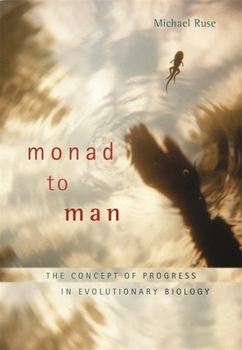Monad to Man: The Concept of Progress in Evolutionary Biology
Select Format
Select Condition 
Book Overview
The idea of evolution: it fascinates some of us, disturbs others, and leaves only a very few people indifferent. In a major new interpretation of evolutionary theory, Michael Ruse pinpoints the common source of this attraction and discomfort. A renowned writer on evolutionary theory and its history, Ruse has long been sensitive to the fact that many people--and not simply religious enthusiasts--find something deeply troubling about much of what...
Format:Paperback
Language:English
ISBN:0674032489
ISBN13:9780674032484
Release Date:March 2009
Publisher:Harvard University Press
Length:648 Pages
Weight:2.30 lbs.
Dimensions:1.9" x 6.3" x 9.2"
Customer Reviews
1 rating
His pet peeve
Published by Thriftbooks.com User , 21 years ago
This massive bit of research into the history of evolutionary thought represents Michael Ruse's attempt to convince fellow scientists to show interest in what he sees as two fundamental issues in evolutionism. The first is the dissonance between it and other scientific enquiries. More specifically Ruse is concerned about the indifference physicists, chemists, and other scientists engaged in the "practical" sciences show towards evolution. They hardly care about evolution's focus on origins and are instead interested in their own experiments. The second issue is Ruse's pet peeve. It is the tendency, which he says he can trace back 250 years, for evolutionism to be influenced by cultural values. More specifically, Ruse says that the idea of social progress has always had a close relationship with evolution. This is the subject which he explores for the vast majority of the book.The best encapsulation of this idea of Progress (which Ruse describes with a capital "P" to emphasize its significance)is its movement from the simplest biological form to the most complex. Thus we have from MONAD TO MAN. Ruse says that the idea "that there will be an ongoing improvement of human society through human effort was the parent idea of evolution, which was taken to have at its heart the idea of biological progress." He shows that it was in fact the norm in Darwin's time. But is it still so today, and of critical importance to readers of this book, does Ruse make a convincing argument that it is so? More importantly still, does he make a case to convince his fellow scientists to care? I say yes to the first part (and at over 600 pages his book had better be convincing!) He points out that from about the 1950's there was a shift and evolutionary science became more objective. Ruse is very convincing in showing that this was not as a result of scientists giving up belief in social or biological Progress, but merely the suppressing of these ideas at the behest of professionalizers. I doubt that he's convinced too many of his colleagues though. It seems instead that he's annoyed them. One scientist commenting on the book in the "National Review" said Ruse's belief that progress was a cultural value was a "stretch" and that "to suggest as he does that such a belief actually affects the content of contemporary evolutionary biology is simply unjustified." I'd suggest you read and decide for yourself. It's worth it considereing some of the present day scientists he interviewed and whose work he looks at - Stephen Jay Gould, Ernst Mayr, John Maynard Smith, and E.O. Wilson. The only caveat is the size of the book and that in making sure that he's not a "popularizer" himself, Ruse does not write with the general reader in mind.





